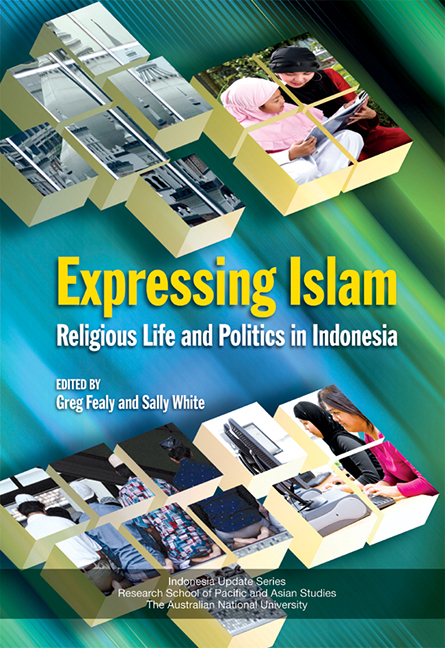Book contents
- Frontmatter
- Contents
- List of Figures and Tables
- List of Contributors
- Acknowledgments
- Glossary
- Map
- 1 Introduction
- PART I EXPRESSING PERSONAL PIETY
- PART II POLITICAL, SOCIAL AND LEGAL EXPRESSIONS OF ISLAM
- 7 Religion, Politics and Social Dynamics in Java: Historical and Contemporary Rhymes
- 8 Islam and Gender in Contemporary Indonesia: Public Discourses on Duties, Rights and Morality
- 9 Online Fatwa in Indonesia: From Fatwa Shopping to Googling a Kiai
- 10 Regional Sharia Regulations in Indonesia: Anomaly or Symptom?
- 11 ‘As Long as It's Halal’: Islamic Preman in Jakarta
- 12 Indonesian Terrorism: From Jihad to Dakwah?
- PART III THE ISLAMIC ECONOMY
- Index
- Indonesia Update Series
- Plate section
10 - Regional Sharia Regulations in Indonesia: Anomaly or Symptom?
from PART II - POLITICAL, SOCIAL AND LEGAL EXPRESSIONS OF ISLAM
Published online by Cambridge University Press: 21 October 2015
- Frontmatter
- Contents
- List of Figures and Tables
- List of Contributors
- Acknowledgments
- Glossary
- Map
- 1 Introduction
- PART I EXPRESSING PERSONAL PIETY
- PART II POLITICAL, SOCIAL AND LEGAL EXPRESSIONS OF ISLAM
- 7 Religion, Politics and Social Dynamics in Java: Historical and Contemporary Rhymes
- 8 Islam and Gender in Contemporary Indonesia: Public Discourses on Duties, Rights and Morality
- 9 Online Fatwa in Indonesia: From Fatwa Shopping to Googling a Kiai
- 10 Regional Sharia Regulations in Indonesia: Anomaly or Symptom?
- 11 ‘As Long as It's Halal’: Islamic Preman in Jakarta
- 12 Indonesian Terrorism: From Jihad to Dakwah?
- PART III THE ISLAMIC ECONOMY
- Index
- Indonesia Update Series
- Plate section
Summary
INTRODUCTION
Indonesia is often cited as the best example of a thriving and continually maturing democracy in Southeast Asia. However, the phenomenon of regionally based legislation linked to religious teachings, which in some instances curtails the democratic freedoms of citizens, appears to be an exception to the overall picture of reform. Despite the encouraging developments of a remarkably free press, successful elections at both the national and regional levels, and significant reforms of the judiciary, good governance remains a challenge for Indonesia. For instance, corruption, while improving, is still a significant problem; a lumbering and inefficient civil service structure impedes efforts to improve effective governance; and economic growth is barely making a dent on poverty (Ramage 2007). As we ponder the issue of sharia-related regional legislation, we need to consider whether such legislation is an anomaly in an otherwise thriving democracy or, rather, an unsurprising symptom of low governance capacity.
The appearance of sharia-related bylaws appears to be linked to the devolution of legislative authority to the districts/municipalities (kabupaten/kota) and provinces as part of the overall process of decentralisation in Indonesia; while the formalisation of Islamic law in Indo-nesia has been rejected at the national level time and time again, there appears to be an increasing number of districts, municipalities and provinces passing regional regulations (perda) that are said to be influenced by sharia. These regulations are frequently referred to in Indonesia as sharia-influenced regional regulations (perda syariah Islam). However, the many problems with that label include the fact that not all of the religionrelated regulations seek to support the implementation of sharia. One such draft regulation in the Christian area of Manokwari, Papua, for example, actually seeks to restrict the building of mosques and the wearing of Muslim headscarves. A second problem is that not all of the perda relate to Islam, as we shall see shortly. For the purposes of this chapter, I will refer to the perda as ‘religion-influenced regional regulations’, although, as we shall see, even this is not entirely accurate.
- Type
- Chapter
- Information
- Expressing IslamReligious Life and Politics in Indonesia, pp. 174 - 191Publisher: ISEAS–Yusof Ishak InstitutePrint publication year: 2008

